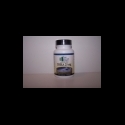Are you tired, worn-out, or just can not regain your normal energy no matter what you do? Have you seen countless physicians who have obtained innumerable tests only to be told the tests are normal and that most likely you are just “depressed”? Have you read many “health books” but have yet to find the answer to your symptoms? Well, if you have answered “yes” to any of these questions you most likely not discovered the real reason for your symptoms. If you are sick and tired of being tired and sick, adrenal fatigue may be the reason that has just not been considered or diagnosed.
Adrenal fatigue (technically called “hypoadrenia” or “hypoadrenalism”) has been one of the most prevalent yet rarely diagnosed conditions for the last fifty years. Despite being described in a medical textbook in the 1800s, and despite the development of effective treatments since the 1930s, most “conventional” physicians are unaware that the problem exists!
You have two adrenal glands about the size of walnuts that sit on top of each kidney. The adrenal glands are the “stress glands” and produce powerful hormones to combat stress and help us deal with stress and change. The adrenal glands produce two important hormones: DHEA and cortisol. In the face of emotional or physical stress, injury, infection, inflammation, allergies or hormonal decline the adrenal glands respond by producing the stress hormones, DHEA & cortisol. If the stress remains and is chronic, the adrenal gland becomes fatigued and produce lower and lower levels of cortisol.
The adrenal gland’s ability to function also decreases to some extent with age. Cortisol potentiates the immune system’s ability to fight infections. Cortisol also promotes the function of thyroid hormones and the sex hormones primarily produced by the ovaries & testes. Cortisol is the body’s natural anti-inflammatory hormone. Symptoms of adrenal fatigue include:
- Morning fatigue (profound)
- Joint or muscle pain
- Diminished libido
- Recurrent infections
- Low blood pressure
- Fainting spells
- Hair loss
- Irregular menstrual cycles
- Insomnia or sleep disturbances
People who suffer from adrenal fatigue frequently have erratic or abnormal blood sugar levels in the form of hypoglycemia. In fact, nearly all patients who have been diagnosed with hypoglycemia suffer from some degree of adrenal fatigue. The decreased adrenal function causes the person to have more issues with allergies, asthma, arthritis pain and a decreased immune response. Most women who have low adrenal function have more premenstrual tension as well as increased difficulty with menopause.
The adrenal glands also have an effect on mental stress. As a result, people with adrenal fatigue show a tendency toward increased fears, anxiety, depression, mental confusion, brain fog and memory difficulties. They often have less tolerance than they would normally have and are more easily frustrated. When the adrenals are not secreting the proper amount of hormones, insomnia or disturbed, non-restful sleep if often an issue.
As adrenal fatigue progresses, it lays the foundation for seemingly unrelated conditions such as frequent respiratory infections, allergies, asthma, frequent colds and a number of other health problems such as Fibromyalgia, chronic fatigue syndrome, hypoglycemia, adult-onset diabetes, auto-immune diseases and even alcoholism. These people may appear to friends and family to be lazy and unmotivated, or to have lost their ambitions when in reality quite the opposite is true; they are forced to drive themselves much harder than people with a healthy adrenal function to accomplish life’s everyday tasks.
The diagnosis of adrenal fatigue can be made by obtaining a detailed history and physical. Often, this is all that is needed to establish at a minimum the suspicion of the problem let alone the actual diagnosis of adrenal fatigue. Adrenal function may be assessed by a number of blood tests or a 24-hour urine collection measuring adrenal hormone levels. The most reliable test that we use at the Wycoff Wellness Center is a 4-vial saliva collection. This is an easily obtained test that is collected at home by the patient spitting into a small vial or tube. The samples are collected at 4 different times during the day and then sent to the laboratory for analysis. A detailed report is returned to the physician that provides specific analysis and recommendations.
Treatment of adrenal fatigue involves helping the patient understand the problem and working to try and reduce or eliminate stressors in their lives. This would include addressing physical stressors such as underlying medical problems along with dealing with emotional stressors. An appropriate healthy diet that stabilizes blood sugar levels is important. This is often a challenging process for patient and physician alike.
Vigorous supplementation of critical nutrients that support the adrenal gland is a cornerstone of therapy. This includes high doses of vitamin C and B5, two critical nutrients that support healthy adrenal function. A number of herbal products and adrenal extracts also help improve adrenal function in many patients. The replacement of needed sex hormones such as progesterone, testosterone, and DHEA often has a profound effect on improving adrenal function.
Bioidentical cortisol is often needed initially to support and improve adrenal function. Bioidentical cortisol is a compounded, natural form of cortisol available through a compounding pharmacy by prescription. This is a safe and effective way to help address adrenal fatigue and often the only treatment that is helpful. The dose of cortisol varies from individual to individual and needs to be monitored by an appropriately trained physician. The treatment course for adrenal fatigue takes times – often 1 to 2 years of treatment is required for complete improvement and resolution of all symptoms.
Adrenal fatigue is real. Adrenal fatigue can be diagnosed and successfully treated. If you are sick and tired of being tired and sick keep looking for the underlying reason(s) that are impacting your health. Find a physician trained to recognize the signs and symptoms of adrenal fatigue and one trained to prescribe bioidentical hormones. Adrenal fatigue is clearly the 21rst century stress syndrome that requires 21rst century diagnosis and treatment to help improve your symptoms!





















